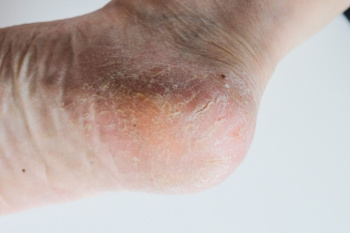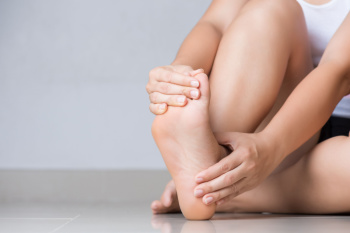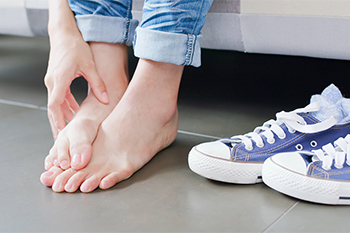
Cracked heels are a common foot condition that can lead to discomfort and even pain if left untreated. They often develop when the skin surrounding the heels becomes dry and thick, leading to splits or fissures. Prolonged standing on hard surfaces can put extra pressure on the feet, causing the skin to expand and crack. As people age, their skin loses moisture and elasticity, making it more prone to dryness. Wearing open-heeled shoes or sandals exposes the heels to air and friction, which can further dry out the skin. Obesity can also contribute to cracked heels, as the increased weight places added pressure on the heel area. Cracked heels can be uncomfortable, and may cause difficulty in completing daily activities. If you have this condition, it is suggested that you confer with a podiatrist who can offer effective treatment solutions, which may include prescribed medication.
If the skin on your feet starts to crack, you may want to see a podiatrist to find treatment. If you have any concerns, contact Priyanka Mude, DPM from North Canton Podiatry. Our doctor can provide the care you need to keep you pain-free and on your feet.
Cracked Heels
It is important to moisturize your cracked heels in order to prevent pain, bleeding, and infection. The reason cracked heels form is because the skin on the foot is too dry to support the immense pressure placed on them. When the foot expands, the dry skin on the foot begins to split.
Ways to Help Heal Them
- Invest in a good foot cream
- Try Using Petroleum Jelly
- Ease up on Soaps
- Drink Plenty of Water
Ways to Prevent Cracked Heels
- Moisturize After Showering
- Skip a Shower
- Keep Shower Water Lukewarm
- Don’t Scrub Your Feet
If you are unsure how to proceed in treating cracked heels, seek guidance from a podiatrist. Your doctor will help you with any questions or information you may need.
If you have any questions, please feel free to contact our office located in North Canton, Ohio . We offer the newest diagnostic and treatment technologies for all your foot care needs.

Instinct tells us to land on our feet during a fall, but that does not always mean it is safe. The force of impact can send shockwaves through the feet, ankles, and legs, leading to serious injuries like fractures, sprains, and even long-term joint damage. Heel fractures, known as calcaneal fractures, are particularly common when landing from a height. The intense pressure can also damage the metatarsals or overstretch the Achilles tendon. Even if bones remain intact, the sudden impact can cause soft tissue injuries that lead to chronic pain or instability. Proper footwear, balance training, and strengthening exercises can help reduce fall risks. If you do fall, rolling or distributing impact across the body can lessen injury severity. When in doubt, it is suggested you get checked by a podiatrist, as what seems like a minor ache can turn into a long-term mobility issue.
Preventing falls among the elderly is very important. If you are older and have fallen or fear that you are prone to falling, consult with Priyanka Mude, DPM from North Canton Podiatry. Our doctor will assess your condition and provide you with quality advice and care.
Every 11 seconds, an elderly American is being treated in an emergency room for a fall related injury. Falls are the leading cause of head and hip injuries for those 65 and older. Due to decreases in strength, balance, senses, and lack of awareness, elderly persons are very susceptible to falling. Thankfully, there are a number of things older persons can do to prevent falls.
How to Prevent Falls
Some effective methods that older persons can do to prevent falls include:
- Enrolling in strength and balance exercise program to increase balance and strength
- Periodically having your sight and hearing checked
- Discuss any medications you have with a doctor to see if it increases the risk of falling
- Clearing the house of falling hazards and installing devices like grab bars and railings
- Utilizing a walker or cane
- Wearing shoes that provide good support and cushioning
- Talking to family members about falling and increasing awareness
Falling can be a traumatic and embarrassing experience for elderly persons; this can make them less willing to leave the house, and less willing to talk to someone about their fears of falling. Doing such things, however, will increase the likelihood of tripping or losing one’s balance. Knowing the causes of falling and how to prevent them is the best way to mitigate the risk of serious injury.
If you have any questions, please feel free to contact our office located in North Canton, Ohio . We offer the newest diagnostic and treatment technologies for all your foot care needs.

Arch pain can result from tight muscles, overuse, or conditions like plantar fasciitis. Stretching the feet helps improve flexibility, reduce tension, and promote better foot function. A simple stretch involves sitting and pulling the toes back toward the shin to lengthen the arch. Rolling a ball or frozen water bottle under the foot massages the area and eases tightness. Standing calf stretches also benefit the arch by loosening the Achilles tendon and lower leg muscles. Using a towel to gently pull the toes upward provides additional relief. Strengthening exercises, such as toe curls and picking up small objects with the toes, improve stability and support. Arch pain can cause difficulty in completing daily activities. If you have this foot condition, it is suggested that you consult a podiatrist who can determine what the cause is and offer treatment, which might include additional stretches for relief.
Why Stretching Is Important for Your Feet
Stretching the feet is a great way to prevent injuries. If you have any concerns with your feet consult with Priyanka Mude, DPM from North Canton Podiatry. Our doctor will assess your condition and provide you with quality foot and ankle treatment.
Stretching the Feet
Stretching the muscles in the foot is an important part in any physical activity. Feet that are tight can lead to less flexibility and make you more prone to injury. One of the most common forms of foot pain, plantar fasciitis, can be stretched out to help ease the pain. Stretching can not only ease pain from plantar fasciitis but also prevent it as well. However, it is important to see a podiatrist first to determine if stretching is right for you. Podiatrists can also recommend other ways to stretch your feet. Once you know whether stretching is right for you, here are some excellent stretches you can do.
- Using a foam roller or any cylindrical object (a water bottle or soda can will do), roll the object under your foot back and forth. You should also exert pressure on the object. Be sure to do this to both feet for a minute. Do this exercise three times each.
- Similar to the previous exercise, take a ball, such as a tennis ball, and roll it under your foot while seated and exert pressure on it.
- Grab a resistance band or towel and take a seat. If you are using a towel, fold it length wise. Next put either one between the ball of your foot and heel and pull with both hands on each side towards you. Hold this for 15 seconds and then switch feet. Do this three times for each foot.
- Finally hold your big toe while crossing one leg over the other. Pull the toe towards you and hold for 15 seconds. Once again do this three times per foot.
It is best to go easy when first stretching your foot and work your way up. If your foot starts hurting, stop exercising to ice and rest the foot. It is advised that you then see a podiatrist for help.
If you have any questions, please feel free to contact our office located in North Canton, Ohio . We offer the newest diagnostic and treatment technologies for all your foot care needs.

Athlete's foot is a fungal infection that affects the skin on the feet, typically between the toes. It causes itching, burning, redness, and peeling or cracking skin. In severe cases, blisters may form, leading to pain and discomfort. Athlete’s foot is caused by fungi thriving in warm, damp environments like locker rooms, around swimming pools, or sweaty shoes. To prevent athlete’s foot, it is important to keep your feet clean and dry, especially between the toes. Change socks regularly, wear breathable shoes, and avoid walking barefoot in public places. Antifungal powders or sprays can help keep the feet dry and reduce the risk of infection. A podiatrist can treat athlete's foot with prescription antifungal medications and provide guidance on proper foot hygiene. They can also offer advice on footwear and recommend lifestyle changes to reduce the risk of recurrence. If you are continuously dealing with athlete’s foot, it is suggested that you schedule an appointment with a podiatrist for appropriate treatment methods, which may include prescribed medication.
Athlete’s foot is an inconvenient condition that can be easily reduced with the proper treatment. If you have any concerns about your feet and ankles, contact Priyanka Mude, DPM from North Canton Podiatry. Our doctor will treat your foot and ankle needs.
Athlete’s Foot: The Sole Story
Athlete's foot, also known as tinea pedis, can be an extremely contagious foot infection. It is commonly contracted in public changing areas and bathrooms, dormitory style living quarters, around locker rooms and public swimming pools, or anywhere your feet often come into contact with other people.
Solutions to Combat Athlete’s Foot
- Hydrate your feet by using lotion
- Exfoliate
- Buff off nails
- Use of anti-fungal products
- Examine your feet and visit your doctor if any suspicious blisters or cuts develop
Athlete’s foot can cause many irritating symptoms such as dry and flaking skin, itching, and redness. Some more severe symptoms can include bleeding and cracked skin, intense itching and burning, and even pain when walking. In the worst cases, Athlete’s foot can cause blistering as well. Speak to your podiatrist for a better understanding of the different causes of Athlete’s foot, as well as help in determining which treatment options are best for you.
If you have any questions please feel free to contact our office located in North Canton, Ohio . We offer the newest diagnostic and treatment technologies for all your foot and ankle needs.
